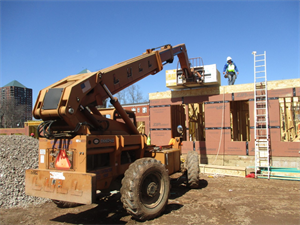Home Investment Partnerships Program (HOME)
The Home Investment Partnerships Program (HOME) supports the City's goal of fostering homeownership opportunities and the rehabilitation and construction of multi-family rental properties.
HOME provides funding to eligible property owners, for-profit and non-profit agencies, and Community Housing Development Organizations (CHDO) for rehab or construction of quality affordable housing. HOME funding must benefit low-income and very low-income households. Since the HOME program’s inception in 1992, over 2000 housing units have been created or improved.
The Housing Division finances amounts not to exceed 20% of a project’s total costs. In addition to underwriting parameters, approved funding levels will be determined by the HOME funds availability. Applicants should demonstrate their ability to leverage other private or public sources of financing. All HOME-assisted units are subject to annual Housing Quality Inspections, ensuring the maintenance of safe, sanitary and quality housing units citywide.
Featured HOME Project - The HUB

The HUB on PARK is a 45-unit, mixed-income housing development sponsored by Mutual Housing Association of Greater Hartford, Inc. (MHAGH) in the Frog Hollow neighborhood. The HUB is an exciting new transit-oriented development (TOD) project located at the intersection of Park Street and Park Terrace, directly across from Pope Park, and within one-half mile of the Parkville CTfastrak station.
This project includes demolition and combining of two parcels on which the 36 new units will be built. An additional three properties at 26 York, 30 York, and 34 York have existing three-family historic buildings that will be gut rehabbed. Click on the photo for more progress photos!
Project-Based Voucher (PBV) Program
The US Department of Housing and Urban Development (HUD) regulations allow communities that are participating in the Housing Choice Voucher Program, to allocate up to 20% of their tenant-based vouchers for Project–Based Assistance. Project-Based Vouchers (PBVs), allow rental subsidies to be attached to specific units. When tenants of the units move, the rental subsidies remain with the unit. PBV's may be used for:
- Geographic distribution of affordable housing; to promote de-concentration of poverty and affirmatively further fair housing objectives
- New construction of workforce and mixed-income housing
- Housing for special-needs populations that provides corresponding supportive services
- Rehabilitation of existing rental units that are dilapidated, unsafe, or unsanitary
If you are a developer or multifamily property owner, please contact Imagineers for more information regarding our Project-Based Voucher Program. The application and award process for Project Based Vouchers is based on funding availability.
Learn more about Competitive and Non-competitive RFPs for PBVs
Review the RFP Announcement and Instructions
Review the RFP Proposal Application Package
Tax Abatement
A tax abatement agreement is a contract between the City of Hartford and the owner of a rental property that fixes taxes on an annual basis at a rate less than the full tax amount. Tax abatement can be used with residential properties that is occupied solely by low or moderate-income persons or families. The housing may be newly created, or existing.
Typically, the term of the abatement is ten (10) years and may be renewed by the contracted property with City approval after a minimum of a one-year lapse between abatements, in which case the owner is expected to pay full tax.
Abatements can be used for one or more of the following purposes:
- To reduce rents below the levels that would otherwise have been in place in the absence of such tax abatement.
- To improve the quality and design of the housing.
- To affect occupancy of such housing by persons/families of varying low/moderate income levels.
- To provide necessary related facilities/services in such housing.